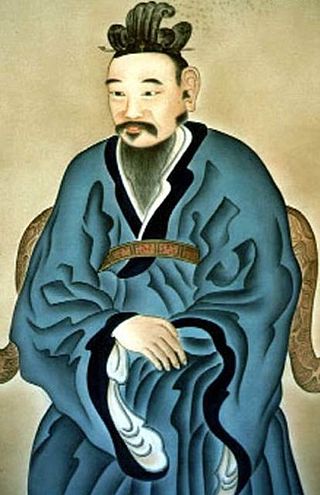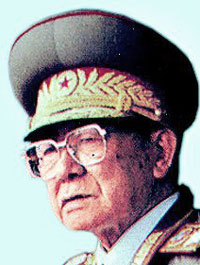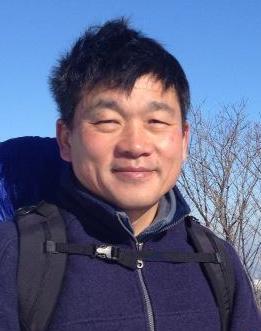Related Research Articles
Choe Yeong, also romanized as Choi Young, was a Korean general born in Hongseong or Cheorwon during the Goryeo period. He became a national hero after he put down the Jo Il-shin (조일신) rebellion. He also participated in the Red Turban Rebellions and later allied with the Ming dynasty to overthrow the Mongol Yuan dynasty. In his final years, General Choe was betrayed and executed by his former subordinate Yi Seong-gye, who founded the Joseon dynasty of Korea, bringing an end to the Goryeo period.

Choe Chiwon was a Korean philosopher and poet of the late medieval Unified Silla period (668-935). He studied for many years in Tang China, passed the Tang imperial examination, and rose to the high office there before returning to Silla, where he made ultimately futile attempts to reform the governmental apparatus of a declining Silla state.

Choi is a Korean family surname. As of the South Korean census of 2015, there were around 2.3 million people by this name in South Korea or roughly 4.7% of the population. In English-speaking countries, it is most often anglicized Choi, and sometimes also Chey, Choe or Chwe. Ethnic Koreans in the former USSR prefer the form Tsoi (Tsoy) especially as a transcription of the Cyrillic Цой.
Choe Chung-heon was a military ruler of Korea during the Goryeo period.

In the North Korean government, the Cabinet is the administrative and executive body. The North Korean government consists of three branches: administrative, legislative, and judicial. However, they are not independent of each other, but all branches are under the exclusive political leadership of the Workers' Party of Korea (WPK).

Parliamentary elections were held in North Korea on 8 March 2009 to elect the members of the 12th Supreme People's Assembly. They were originally scheduled to be held in August 2008 but were postponed for unknown reasons. Observers of North Korea speculated that it was in relation to Kim Jong-il's ill health.
Parliamentary elections were held in North Korea on 3 August 2003. Representatives were elected for five-year terms to all 687 seats of the Supreme People's Assembly, and also to 26,650 positions in city, county, and provincial People's Assemblies. All candidates were members of the three parties constituting the Democratic Front for the Reunification of the Fatherland.
Parliamentary elections were held in North Korea on 2 November 1986. 655 Deputies were elected to the parliament.

Marshal Choe Kwang was a prominent military leader in North Korea.

Parliamentary elections were held in North Korea on 25 August 1948 to elect the members of the 1st Supreme People's Assembly. Organised by the People's Committee of North Korea, the elections saw 572 deputies elected, of which 212 were from North Korea and 360 from South Korea.

Parliamentary elections were held in North Korea on 27 August 1957 to elect members of the 2nd Supreme People's Assembly. Voters were presented with a single list from the Democratic Front for the Reunification of the Fatherland, dominated by the Workers' Party of Korea.

Parliamentary elections were held in North Korea on 8 October 1962 to elect the members of the 3rd Supreme People's Assembly. Only one candidate was presented in each constituency, all of which were selected by the Workers' Party of Korea, although some ran under the banner of other parties or state organisations to give the illusion of democracy. Voter turnout was reported to be 100%, with all reportedly voting in favour of the candidates presented.
Parliamentary elections were held in North Korea on 26 July 1998. 687 deputies were elected to the tenth Supreme People's Assembly. There was only one nominated candidate per constituency - 687 candidates for 687 seats. According to the state news agency KCNA, the turnout rate was 99.85%, and 100% of participating voters cast their ballots in favour of the registered candidates. About two thirds of the deputies were new, and deputies with a military background reportedly doubled in number. Kim Jong-il was unanimously elected in constituency n°666. According to a Rodong Sinmun editorial, this proved "how deep the Korean people's trust in Kim Jong Il is and how powerful and solid the monolithic unity of the people around him in one thought and purpose and with moral obligation is."

ROKS Choe Yeong is a Chungmugong Yi Sun-sin-class destroyer in the South Korean navy. The ship is named after Choe Yeong.
Royal Noble Consort Suk of the Haeju Choe clan is one of best known consorts of Sukjong of Joseon and the mother of Yi Geum, King Yeongjo.

Choe Sang-Hun is a Pulitzer Prize-winning South Korean journalist and Seoul Bureau Chief for The New York Times.
Parliamentary elections were held in North Korea on 9 March 2014 to elect the members of the 13th Supreme People's Assembly.

God of War, also known by the alternative title, Warrior K, is a 2012 South Korean television series starring Kim Joo-hyuk as the real-life historical figure Kim Jun who was written about in the Goryeosa. It aired on MBC from February 11 to September 15, 2012, on Saturdays and Sundays at 20:40 for 56 episodes.

The 10th Supreme People's Assembly of North Korea was in session from 1998 until 2003. It consisted of 687 deputies, and held six sessions.

Parliamentary elections were held in North Korea on 10 March 2019 to elect the members of the 14th Supreme People's Assembly. The elections were announced on 6 January 2019. With only one candidate on the ballot in each constituency, outside observers described it as a show election. 687 candidates for the DPRK deputies to the SPA were elected. Kim Jong Un did not stand for election, marking the first time that a North Korean leader did not participate as a candidate.
References
- ↑ "Choe Won". soccerway.com. Retrieved 16 January 2015.
